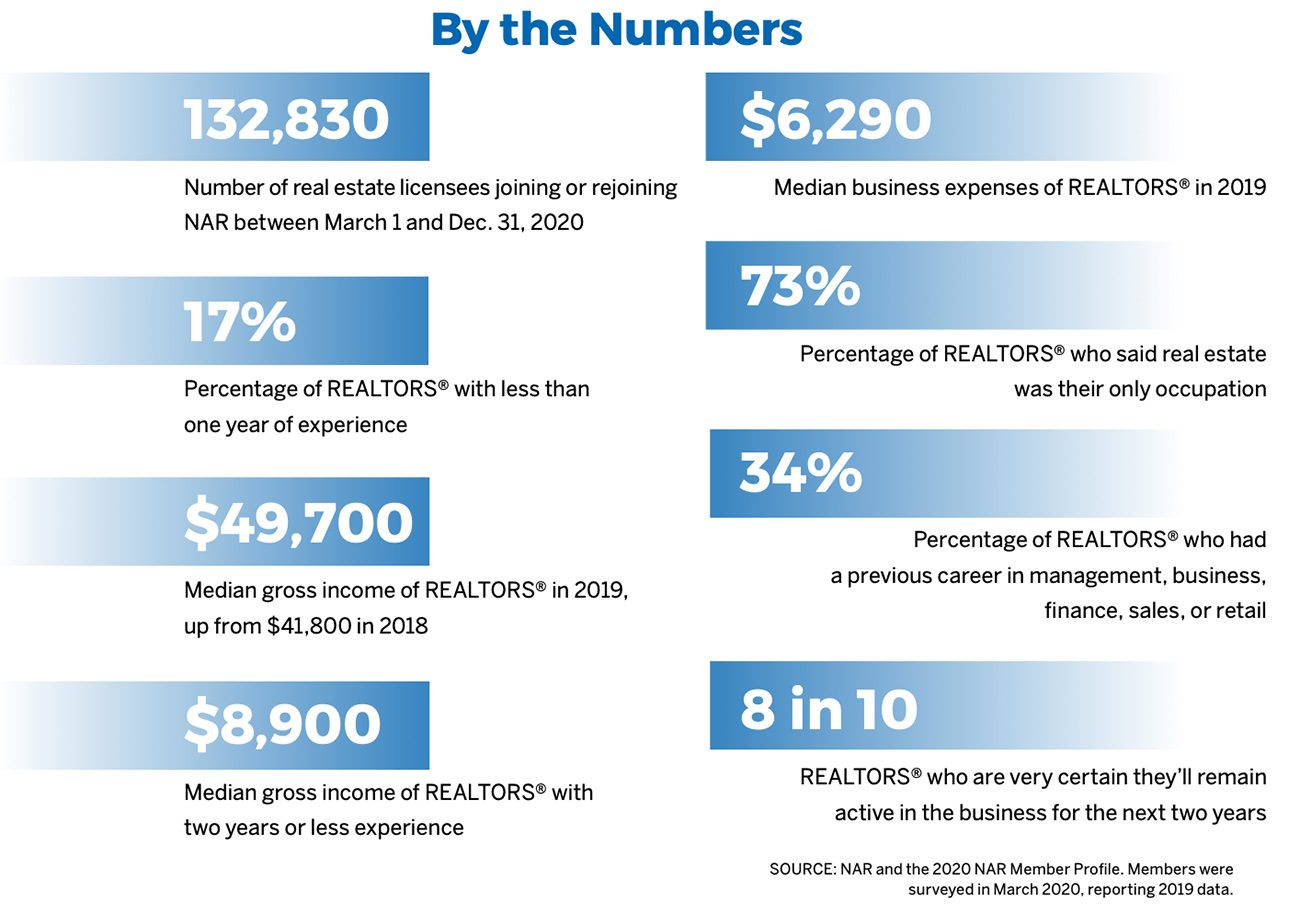
Wendy Wright of Washington, D.C., was ready to take her real estate license exam last March—just as the term “novel coronavirus” was becoming part of the national conversation. After a 20-year career in IT project management, she had recently lost her job at a nonprofit because of funding cuts. Real estate offered an enticing new career path.
But the onset of the pandemic one year ago forced real estate testing centers in her area to close temporarily, requiring Wright to wait two months before she could sit for the test. Instead of just biding her time, Wright joined Katie Wethman’s real estate team at Keller Williams in Washington and began shadowing agents on socially distanced appointments with buyers and sellers. When Wright passed the exam and received her real estate license in June, she was able to hit the ground running at a time when the pandemic was turning many business practices upside down. The result: She closed 10 sales in six months.
Wright says she had no second thoughts about her timing to join the industry. “For me, it was beneficial just to get in, especially with mortgage rates being so low,” she says. “There’s been no shortage of buyers.”
Transformative Time Leads to Innovative Business Practices
Launching a real estate career is never easy, but new agents like Wright have had to adapt to a rapidly changing housing market amid the pandemic—a market facing uncertainty and challenges even for seasoned agents.
When stay-at-home orders at the start of the pandemic sparked a flurry of virtual tours and open houses, newly minted agents quickly learned how to use videoconferencing tools like Zoom and FaceTime to show homes virtually. Take, for example, Rolanda Rogers, a real estate agent at Coldwell Banker KPDD in Columbus, Ga., and Phenix City, Ala., who obtained her license in August 2019. Before the pandemic, Rogers often found clients by contacting sellers of for-sale-by-owner listings and persuading them to list their homes with her.
But when COVID-19 cases spiked, “a lot of FSBOs evaporated overnight,” Rogers says. Her solution? “I started looking through the MLS [for] vacant homes, and I began doing video tours of them with my iPhone and uploading them to my Facebook business page and personal page, which sparked interest from home buyers,” says Rogers. Her strategy worked. “Business has been booming for me,” she says. Since the pandemic, Rogers has sold over $2.6 million in real estate through more than 20 transactions. As Rogers puts it: “The pandemic pushes you to be a go-getter.”
Lauri Rottmayer agrees. Rottmayer, a real estate agent at Davenport Realty in Flippin, Ark., who obtained her license in August, hustled to get her business off the ground after working as an association executive at the local North Central Board of REALTORS® for a year.
Rottmayer, who spent 30 years living in different cities around the world while her husband moved around for his career in telecommunications, leveraged her life experiences to help her as a real estate agent. “Every agent in my office was born and bred here, so I think I bring a unique perspective,” she says. “We have a lot of buyers who are moving here from another state, and I can really connect with them.” Clearly, it’s paid off: Rottmayer sold more than $1.4 million in real estate in just four months.
“I’ve been slammed with business since I started,” Rottmayer says. “Most of my clients have been people who’ve moved here from out of state, from places like Nebraska, Iowa, and Florida.
“My first listing was a cabin, and now I’ve become known as the cabin queen because I met a lot of buyers who were looking for cabins here,” Rottmayer says with a laugh.
Managing the Commercial Market
Like Rottmayer, Vincent Ewing found success quickly. Ewing sold homes for two years before making the switch to commercial real estate in October, when he joined Anthony Hardy’s new team Multifamily Investment Advisors at Keller Williams ONEChicago. “I worked with quite a few investors who were flipping single-family homes, so the experience I acquired in the residential space has translated well,” he says. “I really honed my communication skills with investors before I stepped into the commercial sector.”
One reason Ewing made the transition to the six-agent commercial real estate team was to pursue larger deals. “The commercial sector has bigger fish,” he says. “The commercial investors I’m working with are whales, so to speak.” Although he concentrates his business in the greater Chicago area, “I’m working with investors who have properties nationwide,” Ewing says.
Many sectors of the commercial market have been hit hard by the pandemic. But Ewing says the brokerage he’s affiliated with has suffered a softer blow than most. “We’re a full-service commercial firm, so we’re here to advise clients on profitability,” he explains, “meaning as an adviser I’m working with investors, whether or not they’re actively buying or selling real estate.”
Mentors Help Breed Success
Ewing says Hardy’s dedicated mentorship has been invaluable. “As an agent, you always want to have a guiding hand, especially when you’re starting out,” he says.
Wright expressed a similar sentiment toward her team leader and mentor, Katie Wethman. “In this tough market, it is important to have a mentor who can be a sounding board for the tough decisions needed to help guide buyers,” says Wright, adding that Wethman has helped her craft winning offers in bidding wars and to navigate the challenges of working with first-time home buyers. “I’m very grateful that I started doing real estate on a team,” Wright says.
Rogers, in Columbus, says the pandemic has had a positive impact on her real estate career. “I had to think outside of the box to generate business,” she says. “It’s taught me how to survive in the real estate world,” even under difficult circumstances.


No comments:
Post a Comment